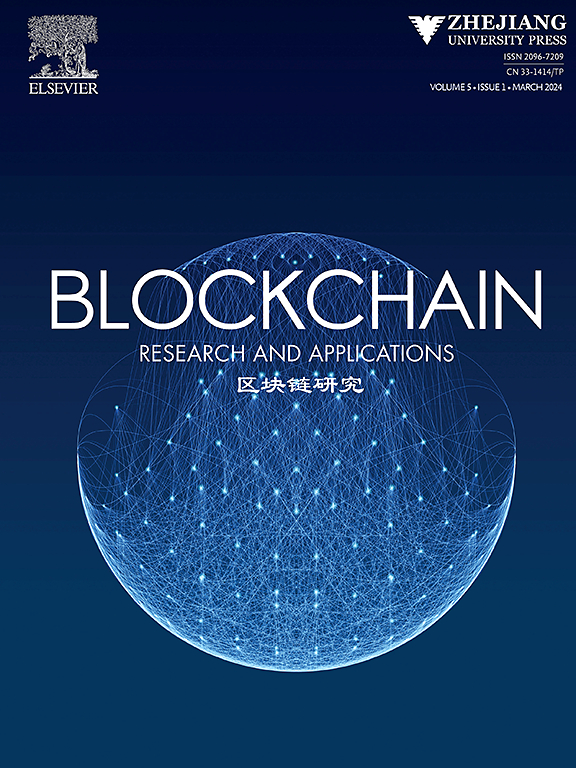Robust cooperative spectrum sensing in cognitive radio blockchain network using SHA-3 algorithm
IF 5.6
3区 计算机科学
Q1 COMPUTER SCIENCE, INFORMATION SYSTEMS
引用次数: 0
Abstract
Cognitive radio network (CRN) uses the available spectrum resources wisely. Spectrum sensing is the central element of a CRN. However, spectrum sensing is susceptible to multiple security breaches caused by malicious users (MUs). These attackers attempt to change the sensed result in order to decrease network performance. In our proposed approach, with the help of blockchain-based technology, the fusion center is able to detect and prevent such criminal activities. The method of our model makes use of blockchain-based MU detection with SHA-3 hashing and energy detection-based spectrum sensing. The detection strategy takes place in two stages: block updation phase and iron out phase. The simulation results of the proposed method demonstrate 3.125%, 6.5%, and 8.8% more detection probability at −5 dB signal-to-noise ratio (SNR) in the presence of MUs, when compared to other methods like equal gain combining (EGC), blockchain-based cooperative spectrum sensing (BCSS), and fault-tolerant cooperative spectrum sensing (FTCSS), respectively. Thus, the security of cognitive radio blockchain network is proved to be significantly improved.
基于SHA-3算法的认知无线电区块链网络鲁棒协同频谱感知
认知无线电网络(Cognitive radio network, CRN)明智地利用可用的频谱资源。频谱感知是CRN的核心要素。然而,频谱感知容易受到恶意用户(MUs)的多重安全漏洞的影响。这些攻击者试图改变感知结果,以降低网络性能。在我们提出的方法中,借助基于区块链的技术,融合中心能够检测和预防此类犯罪活动。我们的模型方法利用基于区块链的MU检测与SHA-3哈希和基于能量检测的频谱感知。检测策略分为两个阶段:块更新阶段和清除阶段。仿真结果表明,与等增益组合(EGC)、基于区块链的合作频谱感知(BCSS)和容错合作频谱感知(FTCSS)等方法相比,该方法在−5 dB信噪比(SNR)下的检测概率分别提高了3.125%、6.5%和8.8%。从而证明认知无线电区块链网络的安全性得到了显著提高。
本文章由计算机程序翻译,如有差异,请以英文原文为准。
求助全文
约1分钟内获得全文
求助全文
来源期刊
CiteScore
11.30
自引率
3.60%
发文量
0
期刊介绍:
Blockchain: Research and Applications is an international, peer reviewed journal for researchers, engineers, and practitioners to present the latest advances and innovations in blockchain research. The journal publishes theoretical and applied papers in established and emerging areas of blockchain research to shape the future of blockchain technology.

 求助内容:
求助内容: 应助结果提醒方式:
应助结果提醒方式:


